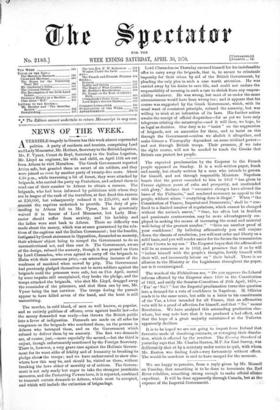The expected proclamation by the Emperor to the French people
appeared on Sunday. It is a well-written paper, frank and manly, but clearly written by a man who intends to govern for himself, and not through responsible Ministers. Napoleon boasts that the power conceded to him in 1852 " has given to France eighteen years of calm and prosperity, not unattended with glory," declares that "successive changes have altered the bases of the Plebiscite," and rendered necessary an appeal to the people, without whom " everything done is illegal." When " the Constitution of France, Imperial and Democratic," shall be " con- fined to a limited number of regulations, which cannot be changed without the nation's assent," " time, too often lost in fruitless and passionate controversies, may be more advantageously em- ployed in seeking the means of increasing the moral and material well-being of the greatest number." "Give me another proof of your confidence ! By balloting affirmatively you will conjure down the threats of revolution, you will seat order and liberty on a solid basis, and you will render easier for the future the transmission of the Crown to my son." The Emperor hopes that the affirmatives will be as numerous as in 1852, and promises that if so he will "imbue himself with the people's thoughts, fortify himself with their will, and incessantly labour on " their behalf. There is no allusion to the Ministry or the Legislature throughout the paper, nor is it countersigned.


































